Log In
Remember meForgot password?
Forgot Password?
The Apartment
I think about great last lines maybe more than I should. Some people argue that a great finish can overcome an otherwise mediocre movie by sending the audience home on a high note; a great last line helps them forget—or at least forgive—how they just spent their last two hours. I don’t buy that. A truly great last line does not stand alone. It gets its greatness by playing off of everything that came before it. The entire story is a carefully crafted set-up leading to the gut punch of “Forget it, Jake, it’s Chinatown” or the triumphant “That’ll do, pig. That’ll do.”
When it comes to filmmakers with mastery over the art of final words, there’s everyone else and then there’s Billy Wilder. Everybody knows the end of Sunset Boulevard, even if they’ve never seen the movie; and Some Like It Hot’s “Well, nobody’s perfect” is a hilarious, ahead-of-its-time classic. But for my money the best of the bunch is The Apartment.
Shut up and deal.
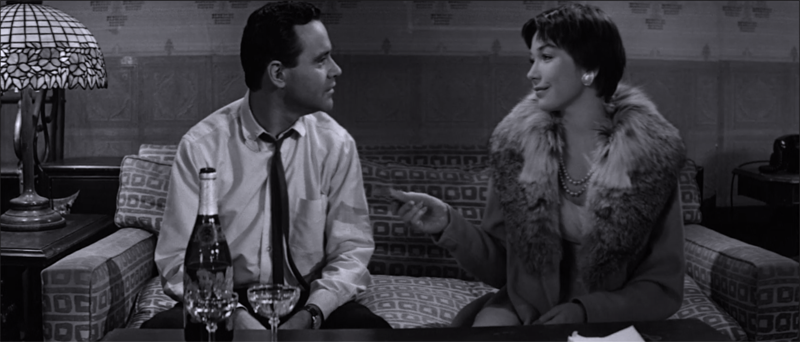
Jack Lemmon stars as C.C. Baxter, a low-level employee at a giant insurance company in New York. He’s dedicated to his work but he’s also a meek pushover who has been intimidated into letting his bosses use his conveniently located apartment for their extramarital flings. [Editor’s note: Let’s break here a moment to marvel that Baxter lives in a second-floor apartment on W 67th Street, half a block from Central Park, and he pays $84/month rent. I mean, holy shit, 1960, right?] Anyway, likable and nervously talkative Baxter is in love with charming elevator operator Fran Kubelik (Shirley MacLaine). Unbeknownst to Baxter, though, his married boss Jeff Sheldrake (Fred MacMurray, playing against type) is already having an affair with Kubelik—and things come to a head when Sheldrake starts using Baxter’s apartment to do it.
It’s only fair to warn you, you are now alone with a notorious sexpot.
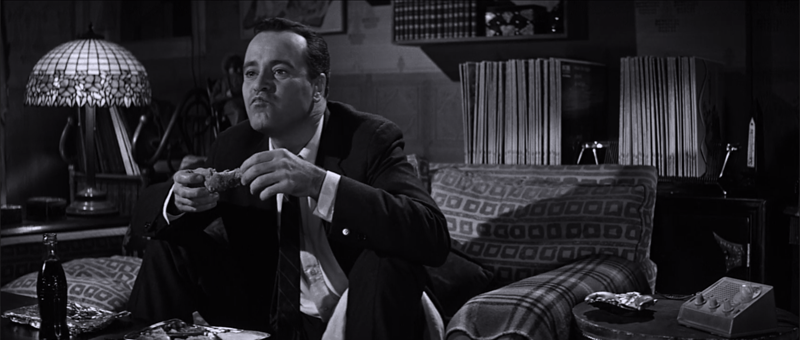
The Apartment is a darkish romantic comedy with outstanding, quotable dialogue, lovable leads, and excellent performances throughout. Don’t let the black & white scare you away. It’s also a great example of a story that can be broken down into small, easy to comprehend units. Just look at the symmetry of the act breaks: the first and final acts each take almost exactly 25% of the film’s run time, while act two splits its 50% at a midpoint (Baxter’s discovery of overdosed Fran on his bed) that arrives halfway through on the dot.
- Act One. Set-up. We meet Baxter, learn about his predicament with his bosses and his apartment, and his crush on Fran. His excitement at his potential promotion at the end of the act is tempered by Sheldrake’s desire to use Baxter’s apartment, but it’s still enough to encourage Baxter to go after Fran, which pushes us into the second act.
- Act Two, part one. Conflict. Baxter pursues Fran. Unfortunately, Fran is already having an affair with Sheldrake. Her discovery that Sheldrake is using her, and Baxter’s discovery of the affair, lead Baxter to get drunk and Fran to attempt suicide.
- Act Two, part two. Conflict, continued. Baxter discovers Fran unconscious in his apartment. This entire quarter of the movie deals with Baxter’s attempt to save Fran’s life and help her recover.
- Act Three. Resolution. If you love something, set it free. When Fran is well enough she goes back into the world, and potentially back to Sheldrake. But Baxter has learned something about himself, and at last he begins to stand up as a human being. He will no longer be pushed around by Sheldrake and the other bosses. When word gets back to Fran that Baxter has quit his job over her, she decides that he’s the one she wants to be with after all.
That’s the way it crumbles, cookiewise.
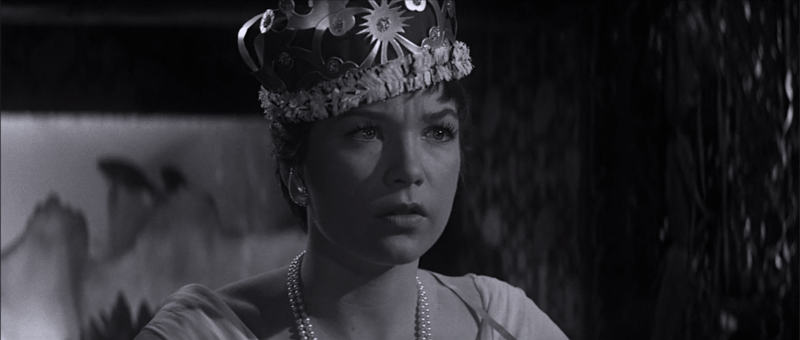
Of course a story’s charm doesn’t come from its structure. It comes from its characters and what they do and what they say and how they say it. Neither Wilder nor co-writer I.A.L. Diamond were native speakers of English, but that didn’t stop them from rising up through the old Hollywood system and cranking out reams of dialogue that was not only entertaining, but that always efficiently advanced their plots while ringing true to the wide variety of people portrayed. They made it look effortless.
BAXTER
I have something here — I think it belongs to you.
Out of his pocket he has slipped the compact with the fleur-de-lis pattern we saw Fran use at the Rickshaw. He holds it out to Sheldrake.
SHELDRAKE
To me?
BAXTER
I mean — the young lady — whoever she may be — it was on the couch when I got home last night.
SHELDRAKE
Oh, yes. Thanks.
BAXTER
The mirror is broken. It was broken when I found it.
SHELDRAKE
So it was. She threw it at me.
BAXTER
Sir?
SHELDRAKE
You know how it is — sooner or later they all give you a bad time.
BAXTER
(man-of-the-world)
I know how it is.
SHELDRAKE
You see a girl a couple of times a week — just for laughs — and right away she thinks you're going to divorce your wife. I ask you — is that fair?
BAXTER
No, sir. That's very unfair — especially to your wife.
This is a nice bit of dialogue that accomplishes a number of things with subtle subtext, never directly stating its purpose. It shows Baxter’s obsequiousness and eagerness to please his new benefactor, while revealing to the audience that Sheldrake has been cruelly lying to Fran. It also gets a laugh and shows that Baxter still has his own moral compass, even if it goes over the head of his boss. Finally, it sets up the broken compact as a plot device. This will pay off in a powerful (and wordless!) way when Baxter discovers that it belongs to Fran, and that she is Sheldrake’s mistress.
I like it this way — makes me look the way i feel.
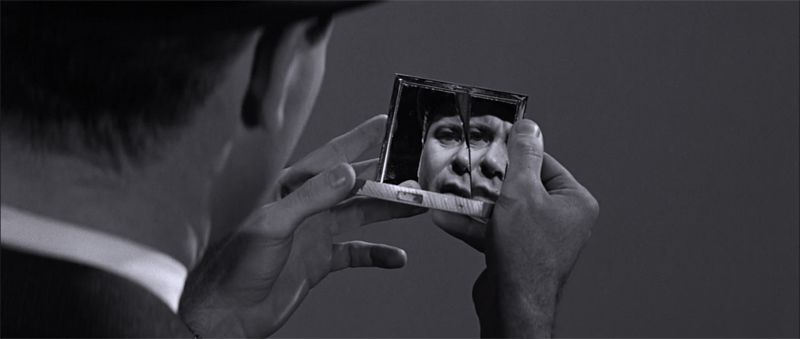
Part of what makes The Apartment such a success is that the story is realistically grounded with something of a cynical world view, focused so heavily as it is on all these extramarital affairs and related deceptions and manipulations, and yet it holds out the hope that good people can rise above it all and make their own place in the world. People can recover from their mistakes and get another chance. The idea resonates thematically with anyone who has made less than perfect choices in their life—in other words, pretty much everyone.
Kubelik and Baxter are characters who undergo a classic transformational arc as their stories progress. They make mistakes, they live in states of denial and assumed powerlessness, they suffer setbacks, and yet they learn and they grow and in the end they take action to become the better people they aspire to be. It’s Baxter’s decision to stand up, to finally ”be a mensch,“ that gets him his happy ending. It’s what earns him Fran’s love at last, although she never says the words.
Fran takes the deck of cards and the gin rummy score pad out of the carton, settles herself on the couch, starts to shuffle the cards expertly.
BAXTER
What about Mr. Sheldrake?
FRAN
I'm going to send him a fruit cake every Christmas.
Baxter sinks down happily on the couch, and Fran holds out the deck to him.
FRAN
Cut.
Baxter cuts a card, but doesn't look at it.
BAXTER
I love you, Miss Kubelik.
FRAN
(cutting a card)
Seven —
(looking at Baxter’s card)
— queen.
She hands the deck to Baxter.
BAXTER
Did you hear what I said, Miss Kubelik? I absolutely adore you.
FRAN
(smiling)
Shut up and deal.
There’s a ton packed into those four final words. Taken literally, they’re a response to Baxter’s tendency toward constant chatter. But also, Fran has just been through the ringer with a man who claimed to love her but who said the words only to get his way. She has to be a bit gunshy, a bit more worldly wise than Baxter, and maybe not quite ready to jump into another round. Mostly, though, this is her version of Han Solo's “I know.” Does she love him? The film leaves that to the audience's imagination, and we imagine only the best. Sure, she loves him, and we love her even more for dodging the question.
Shut Up and Deal Shirt

Double Feature Suggestion
Go one of two ways with this:
- Stick with Billy Wilder and Fred MacMurray again as an insurance man gone bad in Double Indemnity.
- Or trade in the cha-cha for rock ’n’ roll with another tale of a poor schnook in love with a woman in love with the wrong man. Cameron Crowe is a Billy Wilder superfan (he wrote the book on it) and Almost Famous owes a lot to The Apartment. It's also fascinating to see how much the world had changed (and yet stayed the same) in the dozen or so years that separate the two stories.
Screenplay Link
Comments
Join to Comment
or
<< La La Land << >> Kiss Kiss Bang Bang >>
Just because I wear a uniform doesn’t make me a Girl Scout.

My Books
Recent Posts
- Before Sunrise
- Pulp Fiction
- Moonrise Kingdom
- Party Down
- Eternal Sunshine of the Spotless Mind
- The Limey
- La La Land
- The Apartment
- Kiss Kiss Bang Bang
- John Wick
- Election
- Casablanca
Story Circle Notebooks
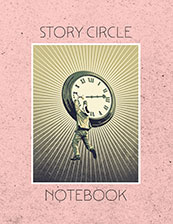
| 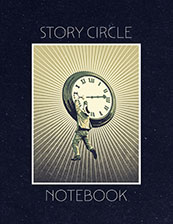
|
These notebooks contain story circle templates and blank dot-grid pages that are great for breaking down your own creations or analyzing the structure of existing films and stories. Purchase from Amazon:
Help Me Choose
What movie should I write about next? I have a few ideas, but I‘m open to suggestions:
CatsChildren Of Men
Donnie Darko
Four Weddings and a Funeral
Good Will Hunting
Grosse Point Blank
Hell or High Water
Jo Jo Rabbit
La Dolce Vita
La Notte
Logan
Miller's Crossing
Moonlight (2016)
Never Let Me Go
Pan's Labyrinth
Punch Drunk Love
Rambo
Star Wars
The Big Lebowski
The Nice Guys
The Raid 2
or something else
Vote Results for Upcoming Posts
Thank you for your suggestion! Be sure to sign up below to be notified when new story circles are posted to the site!
Pan's Labyrinth (14%)
Donnie Darko (12%)
Star Wars (11%)
Jo Jo Rabbit (8%)
The Big Lebowski (7%)
Punch Drunk Love (7%)
Children Of Men (6%)
Good Will Hunting (5%)
Hell or High Water (5%)
Other
Thanks again! And hey, if you’d like to write one of these articles, hit me up.
Write for Story24
If you’re interested in contributing to this site, I would love to hear from you. Learn more here:
Other Business
Some of the links on this site are affiliate links. I earn a small commission when purchases are made after these links are clicked.
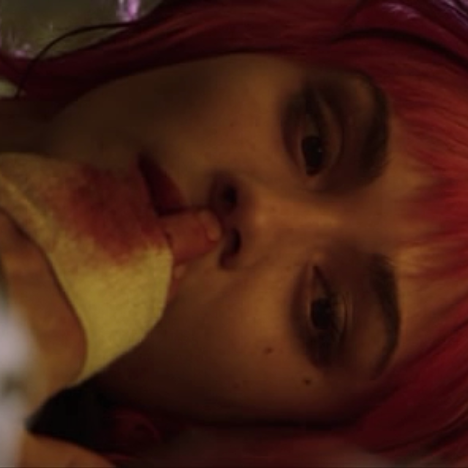


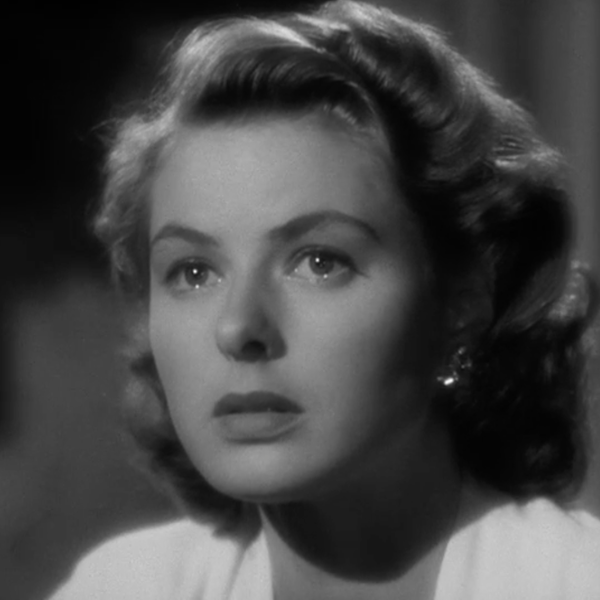
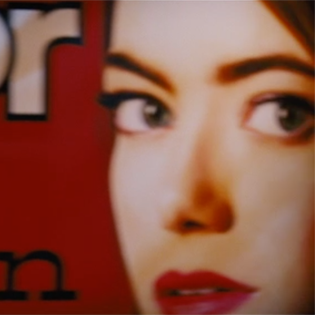
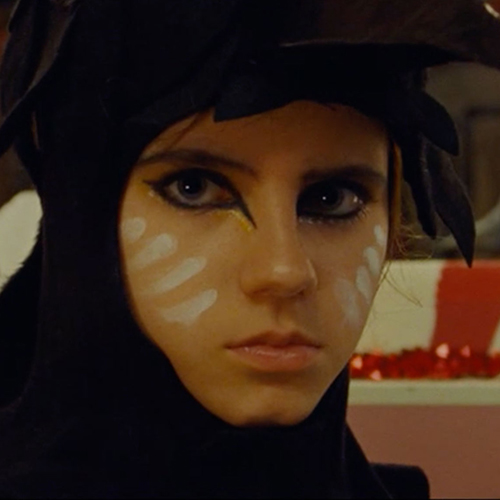

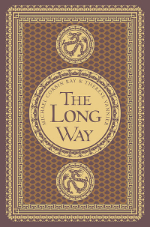
No comments yet.